When it comes to outdoor activities, camping is one of the most popular recreational activities that people engage in. It allows individuals to reconnect with nature and take a break from their busy lives. As enjoyable as camping can be, there are certain responsibilities that come with it, including properly maintaining your camping gear.
One essential piece of equipment for any camper is a tent. Tents provide shelter and protection from the elements, making them crucial for a successful camping trip. However, with frequent use and exposure to the outdoors, tents can get dirty and become a breeding ground for bacteria. That’s where vinegar comes in as a handy and cost-effective cleaning solution.
The Importance of Tent Maintenance
Before we delve into the specifics of cleaning a tent with vinegar, let’s first understand why tent maintenance is absolutely crucial. When you take the time to regularly clean and care for your tent, you are essentially investing in its longevity and saving yourself some hard-earned cash in the long run. By keeping your tent clean and well-maintained, you ensure that it remains in excellent condition for all your future camping adventures.
Therefore, it’s of utmost importance to make cleaning your tent an integral part of your post-camping routine. Taking the time to remove dirt, debris, and any potential mold or mildew will not only ensure a fresh and pleasant camping experience but also extend the lifespan of your beloved tent. So, let’s grab that vinegar and get ready to give our tents the TLC they deserve![3]
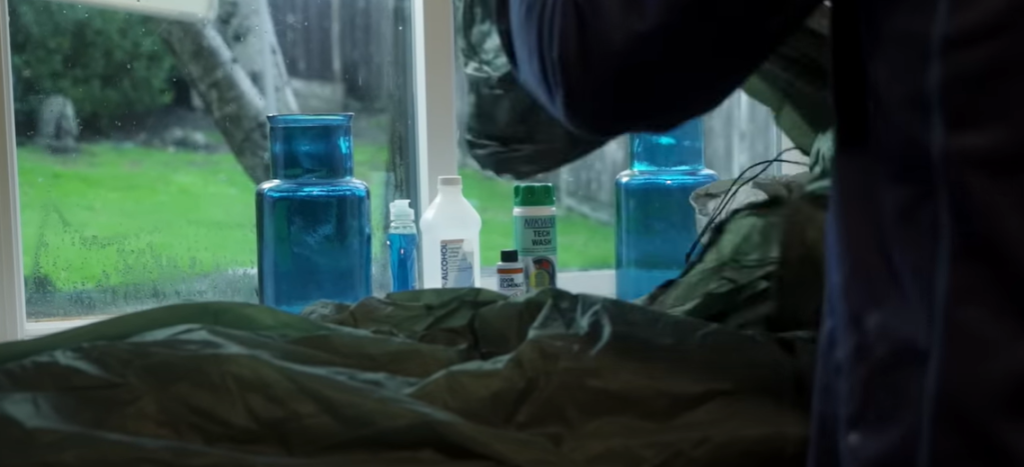
Why Use Vinegar for Cleaning Your Tent?
Vinegar is a natural, non-toxic cleaning agent that has been used for centuries. It’s made from the fermentation of ethanol and contains acetic acid, which gives it its distinctive sour taste and pungent smell. While it may not be your go-to condiment for cooking, vinegar’s acidic properties make it an excellent cleaning solution.
One of the main reasons to use vinegar for cleaning your tent is its affordability. Unlike some commercial cleaners that can be expensive and contain harsh chemicals, vinegar is readily available and costs just a fraction of the price. Plus, there’s no need to worry about any harmful residue left behind since vinegar is safe for both humans and pets.
Moreover, vinegar has powerful antibacterial properties, making it an effective way to remove dirt, grime, and potential bacteria from your tent. It also acts as a natural deodorizer, eliminating any unpleasant smells that may have accumulated on your tent.
Lastly, vinegar is gentle on the environment. With more and more people becoming conscious of their environmental impact, using natural ingredients like vinegar for cleaning purposes is an eco-friendly choice.[3]
Gathering Your Supplies
Before we jump into the steps for cleaning a tent with vinegar, it’s essential to gather all the necessary supplies. Here’s a list of what you’ll need:
- To effectively clean your tent, gather the following items:
- White distilled vinegar (avoid using apple cider vinegar or any other type as they may stain your tent) to create a natural cleaning solution.
- A convenient spray bottle or a sponge for easy application of the cleaning solution.
- A soft-bristled brush, preferably made of nylon, to gently scrub away dirt and grime.
- Warm water to dilute the vinegar solution and aid in the cleaning process.
- If you have a larger tent, consider using a spacious tub or basin to clean it more efficiently.
- Optionally, you may use a mild detergent or soap to enhance the cleaning power, although it is not necessary.
- Finally, have soft cloths ready for drying to protect the fabric and maintain the integrity of your tent.[2]
With these tools at your disposal, you can ensure a thorough and effective cleaning of your tent, prolonging its lifespan and maintaining its quality for future outdoor adventures.
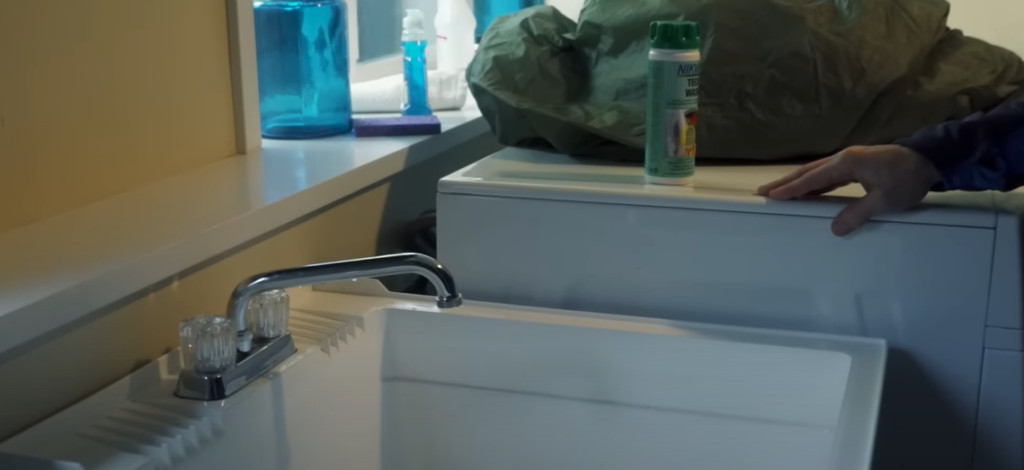
Preparing the Tent for Cleaning
Now that you have all your supplies ready, it’s time to prepare your tent for cleaning. Here are some essential steps to follow:
- Start by removing any debris or large particles from both the interior and exterior of the tent. You can use a broom, vacuum cleaner, or simply shake out any loose dirt.
- Next, set up your tent in an open, well-ventilated area. This will make it easier to clean and allow your tent to dry quickly after cleaning.
- Once your tent is set up, take a damp cloth or sponge and wipe down the interior and exterior of the tent. This will help remove any remaining dirt or grime before moving on to the actual cleaning process.
- If your tent has any particularly stubborn stains, you can use a mild detergent or soap to pre-treat them before using the vinegar solution. Just make sure to thoroughly rinse out the soap before applying the vinegar.[2]
With these simple steps, your tent will be ready for a deep and thorough cleaning with vinegar. In our next section, we’ll dive into how to create and apply the vinegar solution for optimal results.
Cleaning the Tent with Vinegar
Making a Vinegar Solution
To create an effective vinegar solution for cleaning your tent, follow these easy steps:
- Start by preparing a large bucket or tub. Combine one part white distilled vinegar with two parts warm water. Feel free to adjust the vinegar ratio if your tent requires extra cleaning power.
- If you prefer a more convenient application, consider using a spray bottle instead. Simply mix the vinegar solution in the spray bottle and make sure to give it a good shake before each use.
- For those seeking an enhanced cleaning effect, you can optionally add a small amount of mild detergent or soap to the solution. This will help tackle stubborn stains and dirt, leaving your tent looking fresh and pristine.[1]
By following these detailed steps, you can ensure a thorough and effective cleaning process for your tent, making it ready for your next outdoor adventure!
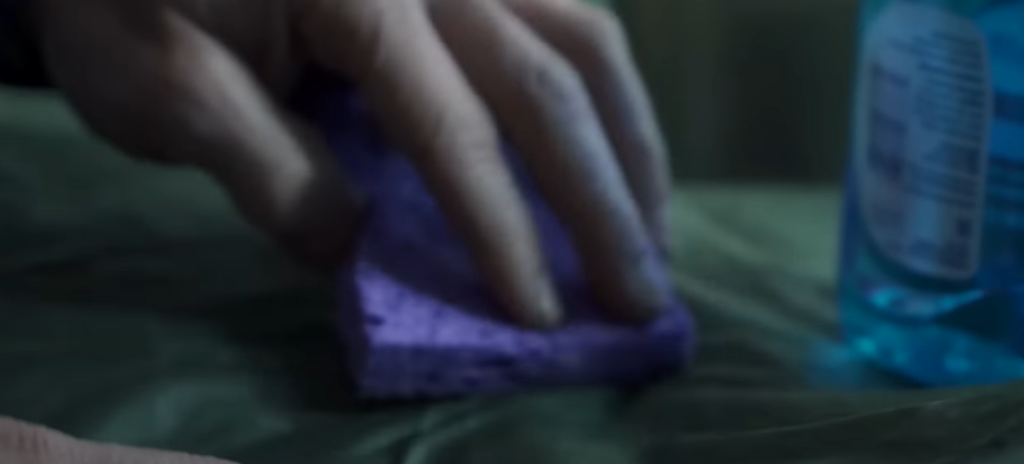
Spot Cleaning Stains
If you happen to come across any particularly stubborn stains during the cleaning process, worry not! You can easily tackle them by spot cleaning with a sponge or cloth that has been dipped in undiluted vinegar. Simply gently rub the affected area in circular motions until the stain starts to vanish before your eyes. Once you’ve successfully bid farewell to the stain, rinse the area with a splash of cold water to ensure a sparkling and pristine finish.[1]
Cleaning the Tent Fabric
When cleaning the tent’s fabric, it’s crucial to keep in mind that you don’t want to oversaturate it with vinegar. Doing so may lead to discoloration or damage to the fabric. Instead, work in small sections and use a gentle hand when scrubbing away dirt and grime. Make sure to rinse out your sponge or cloth frequently throughout the process to avoid transferring dirt back onto the fabric.
Remember to allow the fabric to air dry completely before storing the tent to prevent the growth of mold or mildew. It’s also a good idea to inspect the fabric for any signs of wear or tear and address them promptly to maintain the durability and longevity of your tent.[1]
Cleaning Zippers and Mesh Panels
When it comes to maintaining your tent, don’t overlook the importance of caring for the zippers and mesh panels. Over time, these areas can accumulate dirt and grime, which can hinder their functionality. To ensure smooth operation, it’s recommended to clean the zippers regularly. You can do this by using a soft cloth or toothbrush dipped in a vinegar solution to gently scrub away any buildup. Taking the time to pay attention to these small details can help prolong the lifespan of your tent and ensure a hassle-free camping experience.[1]
Mold and Mildew Removal
If you notice any signs of mold or mildew on your tent, it’s crucial to address it immediately. Not only can these growths cause an unpleasant odor and discoloration, but they can also compromise the structural integrity of your tent. To remove mold and mildew, mix equal parts vinegar and warm water in a spray bottle and thoroughly spray the affected areas. Let the solution sit for at least 10 minutes before scrubbing away with a soft-bristled brush or sponge. Rinse the area with cold water and allow it to air dry completely. If the mold or mildew persists, consider repeating this process until it disappears.[1]
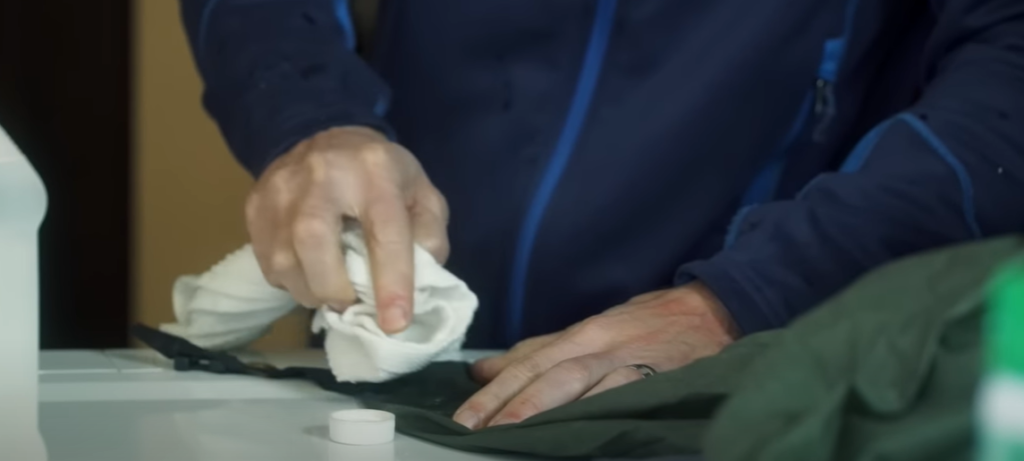
Rinsing and Drying Your Tent
After the cleaning process is complete, it’s crucial to thoroughly rinse and dry your tent before storing it to ensure maximum longevity and performance. This step is essential as it guarantees the removal of all traces of vinegar and dirt from the fabric, minimizing the risk of potential damage or discoloration.
For the rinsing process, it is recommended to fill a large bucket or tub with cold water and immerse the tent completely. Gently swish it around in the water, ensuring that every part of the fabric is thoroughly washed to eliminate any lingering vinegar or dirt residue. Alternatively, you can also use a hose for this step, taking care not to apply excessive pressure onto the fabric, which could potentially cause damage.
Once the rinsing is complete, it’s time to focus on the drying process. The best approach is to either hang the tent or lay it out on a clean surface, preferably in direct sunlight. The sunlight not only aids in speeding up the drying process but also helps to eliminate any remaining mold or mildew spores that may be present. It is important to open up all the zippers and mesh panels to allow for proper air circulation, ensuring that every part of the tent dries thoroughly.
Taking the time to ensure that your tent is completely dry is crucial before packing it away for future use. This will prevent any moisture from being trapped inside, which could lead to the growth of mold or mildew. Once your tent is fully dry, you can confidently pack it away, knowing that it will be in optimal condition for your next adventure.[4]
Maintenance Tips
In addition to regularly cleaning your tent with vinegar, there are a few maintenance tips you can follow to ensure its longevity and performance. These include:
- After each camping trip, it is important to set up and air out your tent. This helps to prevent any moisture or odors from lingering and ensures that your tent remains fresh for the next adventure.
- When storing your tent, make sure it is completely dry. Avoid packing it away when it is wet or damp, as this can lead to mold and mildew growth. Take the time to air it out and ensure it is thoroughly dry before storing it.
- To provide extra protection for your tent, consider using a ground cloth or tarp underneath it. This will help to prevent any sharp objects or rough terrain from causing damage to the bottom of your tent, prolonging its lifespan.
- When your tent is not in use, it is best to keep it away from direct sunlight and harsh weather conditions. Excessive exposure to sunlight can cause the fabric to fade and weaken over time. Similarly, exposure to harsh weather conditions such as heavy rain or strong winds can put unnecessary stress on the tent, potentially leading to damage.[4]
By following these maintenance tips and incorporating vinegar into your cleaning routine, you can ensure that your tent remains in top condition for many outdoor adventures to come.
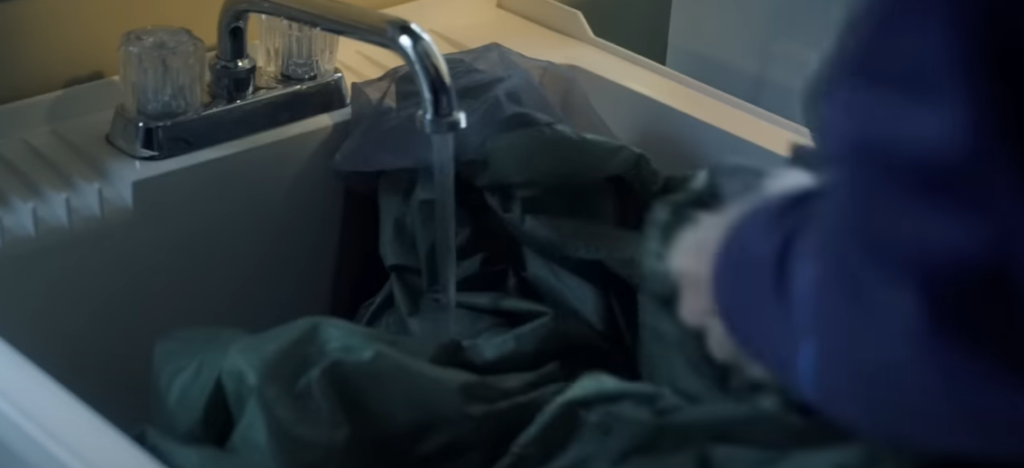
FAQ
How do you clean and deodorize a tent?
To clean and deodorize a tent, you can use a solution of equal parts vinegar and warm water. Apply the solution with a sponge or cloth, gently scrubbing any stubborn stains or odors. Rinse thoroughly with cold water and allow to air dry completely before storing.
How do you clean mold off a tent with vinegar?
To clean mold off a tent with vinegar, mix equal parts vinegar and warm water in a spray bottle. Spray the affected areas and let the solution sit for at least 10 minutes before scrubbing away with a soft-bristled brush or sponge. Rinse with cold water and air dry completely.
Does vinegar really remove mold?
Yes, vinegar is an effective and natural solution for removing mold. Its acidic properties help to break down and remove the mold spores, leaving your tent clean and free of any lingering odors. So, next time you’re preparing for a camping trip, remember to pack some vinegar along with your other essential gear – your tent will thank you!
Does vinegar destroy mold?
While vinegar is a powerful natural cleaner, it may not be able to completely destroy mold. It can effectively remove surface mold and prevent future growth, but if the mold has penetrated deep into the fabric of your tent, professional assistance may be required to fully eliminate it. However, regular use of vinegar as a cleaning solution can help to keep mold and mildew at bay.
What kills 100% of mold?
According to the Environmental Protection Agency (EPA), a solution of 1 cup bleach per gallon of water is effective in killing mold on hard, non-porous surfaces. However, using bleach on fabric can cause discoloration and may not fully remove the mold spores, making vinegar a safer and more natural alternative for tent cleaning. If you are dealing with a severe mold infestation, it is recommended to seek professional cleaning services. Always exercise caution when using harsh chemicals and make sure to thoroughly rinse and dry your tent after cleaning.
Will mold come back after vinegar?
If the source of the mold growth is not eliminated, it is possible for mold to return even after using vinegar for cleaning. It is important to identify and address any underlying causes of mold growth, such as excess moisture or poor ventilation, to prevent future infestations. Regularly incorporating vinegar into your tent cleaning routine can also help to keep mold at bay. However, if the mold persists despite your efforts to clean and prevent it, it is best to seek professional help. Mold can pose health risks and should be properly treated and eliminated.
How long do I let vinegar sit on mold?
To effectively remove mold using vinegar, it is recommended to let the solution sit on the affected area for at least 10 minutes before scrubbing and rinsing. This allows enough time for the acidic properties of vinegar to break down and loosen the mold spores. For stubborn stains or odors, you may need to let the vinegar solution sit for longer or repeat the cleaning process. Always make sure to thoroughly rinse and dry your tent after cleaning with vinegar.
Useful Video: How to Clean a Tent || REI
Conclusion
In conclusion, vinegar is a versatile and natural solution for cleaning and maintaining your tent. With its ability to remove dirt, stains, and odors, as well as prevent mold and mildew growth, it is an essential item to have on hand for any camping trip. By following proper cleaning techniques and incorporating regular maintenance tips into your routine, you can ensure that your tent remains in top condition and ready for your next outdoor adventure. Remember, a clean tent is a happy tent! So, grab some vinegar and get to cleaning – your tent will thank you! Happy camping!
References:
- https://outdoorish.com/learn/how-to-clean-a-tent-that-smells/
- https://www.wikihow.com/Clean-a-Tent
- https://wildernessredefined.com/how-to-clean-a-tent-that-smells/
- https://www.urbandare.com/how-to-clean-a-tent/





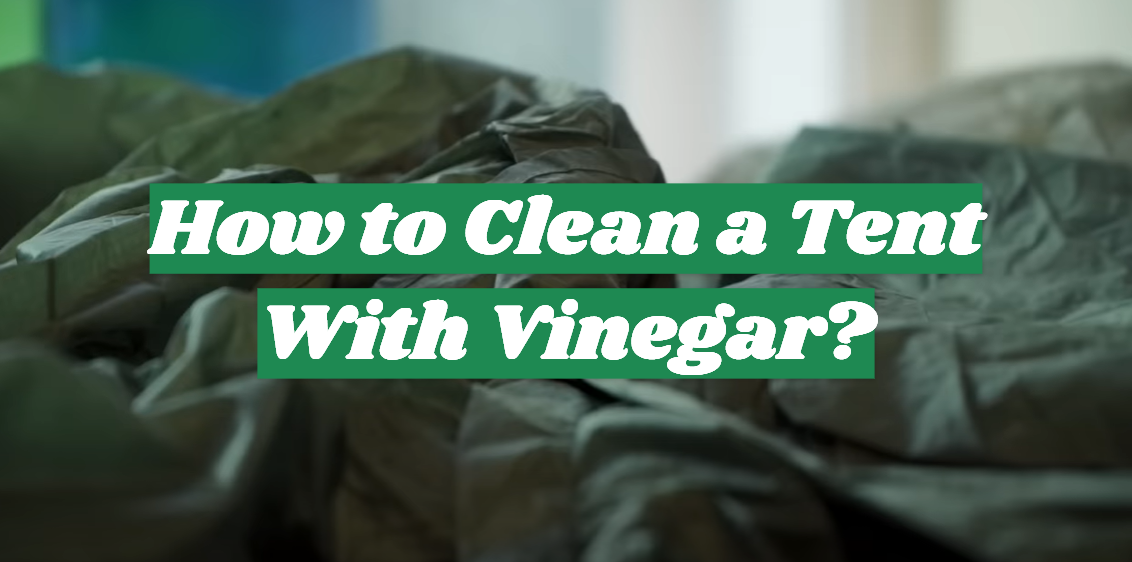



Leave a Review